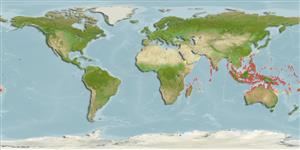>
Kurtiformes (Nurseryfishes, cardinalfishes.) >
Apogonidae (Cardinalfishes) > Apogoninae
Etymology: Sphaeramia: Greek, sphaira = ball + Greek, amia = a kind of shark (Ref. 45335).
More on author: Cuvier.
Environment: milieu / climate zone / depth range / distribution range
Ecología
marino asociado a arrecife; rango de profundidad 0 - 5 m (Ref. 9710). Tropical; 31°N - 27°S, 32°E - 173°W
Indo-Pacific: East Africa to Kiribati, north to the Ryukyu Islands, south to New Caledonia; Belau to eastern Caroline and Mariana Islands in Micronesia.
Length at first maturity / Tamaño / Peso / Age
Maturity: Lm ?, range 6 - ? cm
Max length : 10.0 cm TL macho / no sexado; (Ref. 4329); common length : 8.9 cm SL macho / no sexado; (Ref. 37816)
Espinas dorsales (total) : 8; Radios blandos dorsales (total) : 9; Espinas anales: 2; Radios blandos anales: 9. Greenish grey, with dark vertical bar from origin of spiny dorsal to just in front of anus; scattered spots on body, head and 1st dorsal membrane; pelvic fins dark (Ref. 4329, 48635).
Restricted to coastal waters, forming small aggregations among mangroves, rocks, debris, or piers of shallow sheltered shorelines. Feeds at night (early evening and just before day break), primarily on planktonic crustaceans. Courtship and spawning occur fortnightly (shortly before new moons and full moons). Eggs are incubated by the male for about 8 days. Larval phase pelagic. Sexual maturity is attained at 7 cm by males and at 6 cm by females (Ref. 1602).
Courtship and spawning occur on a semi-lunar cycle, shortly before full and new moons (Ref. 37816). Distinct pairing during courtship and spawning (Ref. 205). Are mouthbrooders (Ref. 240). Males incubate up to 12,000 eggs for a period of about 8 days (Ref. 37816). After the pelagic larval phase, juveniles settle and grow at a rate of 3 to 6 mm per month (Ref. 37816).
Gon, O., 1986. Apogonidae. p. 546-561. In M.M. Smith and P.C. Heemstra (eds.) Smiths' sea fishes. Springer-Verlag, Berlin. (Ref. 4329)
IUCN Red List Status (Ref. 130435)
Threat to humans
Harmless
Human uses
Pesquerías: escaso valor comercial
Herramientas
Special reports
Download XML
Fuentes de Internet
Estimates based on models
Preferred temperature (Ref.
123201): 26.3 - 29.3, mean 28.6 °C (based on 2452 cells).
Phylogenetic diversity index (Ref.
82804): PD
50 = 0.7500 [Uniqueness, from 0.5 = low to 2.0 = high].
Bayesian length-weight: a=0.02138 (0.01194 - 0.03827), b=3.07 (2.91 - 3.23), in cm total length, based on LWR estimates for this species & (Sub)family-body (Ref.
93245).
Nivel trófico (Ref.
69278): 3.6 ±0.51 se; based on food items.
Resiliencia (Ref.
120179): Alto, población duplicada en un tiempo mínimo inferior a 15 meses (Preliminary K or Fecundity.).
Fishing Vulnerability (Ref.
59153): Low vulnerability (10 of 100).
Nutrients (Ref.
124155): Calcium = 159 [79, 274] mg/100g; Iron = 1.01 [0.55, 1.79] mg/100g; Protein = 18.8 [17.5, 20.0] %; Omega3 = 0.109 [0.059, 0.200] g/100g; Selenium = 21.7 [10.4, 46.4] μg/100g; VitaminA = 60.9 [17.3, 211.0] μg/100g; Zinc = 1.79 [1.13, 2.78] mg/100g (wet weight);
